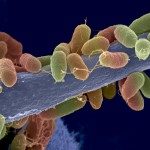Lien vers Pubmed [PMID] – 10809732
J. Biol. Chem. 2000 May;275(20):14882-9
A novel 1,3-beta-glucanosyltransferase isolated from the cell wall of Aspergillus fumigatus was recently characterized. This enzyme splits internally a 1,3-beta-glucan molecule and transfers the newly generated reducing end to the non-reducing end of another 1, 3-beta-glucan molecule forming a 1,3-beta linkage, resulting in the elongation of 1,3-beta-glucan chains. The GEL1 gene encoding this enzyme was cloned and sequenced. The predicted amino acid sequence of Gel1p was homologous to several yeast protein families encoded by GAS of Saccharomyces cerevisiae, PHR of Candida albicans, and EPD of Candida maltosa. Although the expression of these genes is required for correct morphogenesis in yeast, the biochemical function of the encoded proteins was unknown. The biochemical assays performed on purified recombinant Gas1p, Phr1p, and Phr2p showed that these proteins have a 1,3-beta-glucanosyltransferase activity similar to that of Gel1p. Biochemical data and sequence analysis have shown that Gel1p is attached to the membrane through a glycosylphosphatidylinositol in a similar manner as the yeast homologous proteins. The activity has been also detected in membrane preparations, showing that this 1,3-beta-glucanosyltransferase is indeed active in vivo. Our results show that transglycosidases anchored to the plasma membrane via glycosylphosphatidylinositols can play an active role in fungal cell wall synthesis.
